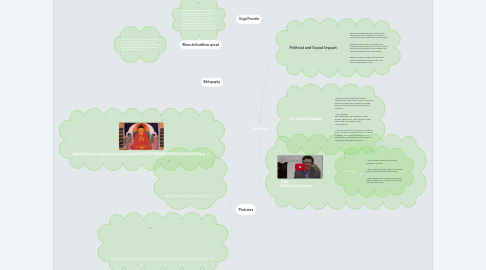Buddhism
создатель Jacob Birecki


1. https://ka-perseus-images.s3.amazonaws.com/b999a3937a27421bb68a7d23d690ee9dd65a1e99.png
2. Pictures
2.1. http://slideplayer.com/14/4239754/big_thumb.jpg
2.2. http://www.mbtchicago.org/wp-content/uploads/2014/10/TempleArtifacts_buddhistWheel-e1418269931567.jpg
3. Origin/Founder
3.1. Buddhism was started by Siddhartha Guatama in the late 6th century B.C.E. in north India. Buddhism is an important religion in most of the Asian countries. Many forms of buddhism have formed over the years, but the main goal in all of the types of religions is to draw teachings from the buddha.
4. Where did buddhism spread
4.1. The spread of buddhism started around 213 B.C.E. Buddhism spread to India, Ceylon, Burma, Nepal, Tibet, central Asia, China and Japan. These are just some of the region where buddhism spread.
5. Bibliography
5.1. Team, Dulcinea. “Sacred Texts in World Religions.” FindingDulcinea, Mark E Moran, www.findingdulcinea.com/guides/Religion-and-Spirituality/Sacred-Texts.pg_0.html.
5.2. The Origins of Buddhism
6. Political and Social Impact
6.1. Buddhism disregarded the caste system and classes even though the majority of civilizations had classes and a caste system
6.2. Buddhism helps unify its followers and civilizations that believed in it mostly due to the peace and kindness of the religion and the disregarding of the caste system
6.3. Buddhism helped some rulers keep their state organized and under control like King Ashoka and his ruling
7. Core Beliefs of Buddhism
7.1. *The Four Noble Truths (the truth of suffering, the truth of the cause of suffering, the truth of the end of suffering, and the truth of the path that leads to the end of suffering.
7.2. * The Eightfold Path (right view, right aspiration, right speech, right action, right livelihood, right effort, right mindfulness, right concentration)
7.3. * The Five Precepts ( to abstain from taking life, to abstain from taking what is not given, to abstain from sensual misconduct, to abstain from false speech, to abstain from intoxicants like drugs or alcohol
8. Video Buddhism Crash Course
8.1. Sacred Texts
8.1.1. * The Tripitaka, which is the earliest Buddhist scripture
8.1.2. * The Mahayana Sutras, which is scripture that the Mahayana Buddhists follow
8.1.3. * The Tibetan Book of The Dead, which is what Buddhists use to teach about what happens after dead

